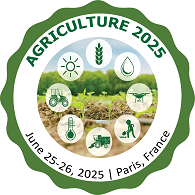Welcome message
Join us to explore innovative research, exchange knowledge, and foster collaborations that shape the future of farming. With keynote sessions, interactive workshops, and networking opportunities, this summit offers a rich platform for meaningful engagement.
Thank you for being part of this global conversation, and we look forward to your insights and contributions. Let’s work together to cultivate a greener, more sustainable world! Enjoy the summit and your time in the beautiful city of Paris!
It is with great pleasure that I extend a warm welcome to all of you for the upcoming 6th Global Summit on Agriculture & Organic Farming, which will take place on June 25-26, 2025, in Paris, France.
About Conference
Join us for the 6th Global Summit on Agriculture & Organic Farming, scheduled for June 25–26, 2025, in Paris, France. This premier event will bring together researchers, industry leaders, policymakers, and practitioners to foster collaboration and innovation in sustainable agriculture. Featuring inspiring keynote speeches, insightful presentations, and engaging discussions, the summit will spotlight advancements, emerging trends, and transformative practices in agriculture and organic farming. Attendees will have the opportunity to connect with experts from Agriculture Associations, Organic Communities, Sustainable Farming Societies, and Agri-Tech Organizations, exploring the impact of innovative technologies and effective policies on the future of global agriculture.
Theme: Cultivating a Greener Future: Innovation and Sustainability
The future of agriculture is shaped by innovation, sustainability, and the need to address global challenges like food security and climate change. Advancements in precision agriculture, smart farming technologies, and genetic engineering are enhancing productivity and resilience. Sustainable practices like organic farming and regenerative agriculture are preserving ecosystems and ensuring long-term viability. Digital transformation, including big data and AI, is optimizing resource use and market connectivity. Climate-resilient crops and circular economy approaches are addressing environmental concerns. Emerging markets in organic and plant-based products, coupled with global collaboration and inclusive policies, are creating new opportunities. The focus on education and research will ensure a resilient and sustainable agricultural future.
Conference highlight
• Sustainable Agriculture Technologies
• Smart Farming Solutions
• Networking Opportunities
• Case Studies of Successful Organic Farms
• Hands-on Organic Farming Demonstrations
• Climate Change & Agriculture Sessions
Why to attend
Attending the Agriculture & Organic Farming 2025 conference is an unparalleled opportunity to immerse yourself in the forefront of sustainable agriculture. This event brings together global experts, innovative farmers, researchers, and policymakers to explore cutting-edge technologies, organic practices, and solutions to pressing challenges like climate change and food security. Participants will gain valuable insights into sustainable farming techniques, market trends, and the growing demand for organic products. With opportunities for networking, professional growth, and showcasing your expertise or innovations, this conference serves as a platform to shape the future of agriculture. Whether you are looking to enhance your skills, influence policy, or discover new business opportunities, Agriculture & Organic Farming 2025 is the place to be.
Benefits of attending:
• Get Certified for your participation
• Exposure to Innovative Technologies
• Global exposure to your research
• Skill Development
• Make new connections
• Get your abstracts published with unique DOI in International Journals
• Get up to 50% discounts for publishing your entire article in our open access International Journals
• Get an access to the network with eminent personalities from worldwide
• Access to Cutting-Edge Research
• Networking Opportunities
Target Audience:
The 6th Global Summit on Agriculture & Organic Farming is designed to attract a diverse group of stakeholders from across the agriculture and organic farming sectors. Attendees will benefit from the opportunity to share knowledge, network, and collaborate on advancing sustainable agricultural practices. Key participants include:
• Agriculture Science Faculty, Students, Scientists
• Plant Science Faculty, Students, Scientists
• Animal Science Faculty, Students, Scientists
• Soil Science and Agricultural Universities
• Agriculture & Food Security
• Manufacturing Agricultural Devices Companies
• R&D Laboratories, Chemical & Fertilizers Industries
• Media partners and Collaborators
• International Delegates and global observers
• Forestry and Landscaping Scientists
• Agriculture and Plant Associations & Societies
• Business Entrepreneurs and Exhibitors
• Research & Training Institutes
• Seed Science and Weed Management Researchers
• Soil science and soil-plant nutrition Experts
Scientific sessions /tracks
1. Sustainable Agricultural Practices
Sustainable agricultural practices aim to meet present food and resource needs while ensuring future generations can do the same. They focus on preserving natural resources, improving soil health, conserving water, and promoting biodiversity. Techniques like crop rotation, organic farming, and agroforestry reduce environmental impact while maintaining productivity. These practices help ensure long-term food security and resilience to climate change.
2. Innovations in Organic Farming
3. Climate Change and Resilient Agriculture
Climate change and resilient agriculture focus on adapting farming practices to the challenges posed by a changing climate. Resilient agricultural methods, such as drought-resistant crops, water-efficient irrigation, and soil conservation techniques, help farmers cope with extreme weather conditions. By incorporating sustainable practices, agriculture can better withstand climate disruptions, ensuring long-term food security and environmental sustainability.
4. Socio-Economic Impacts of Organic Farming
The socio-economic impacts of organic farming include improved livelihoods for farmers, particularly in rural areas, through higher premium prices for organic produce. It promotes job creation in organic supply chains, from farming to retail, and supports local economies. Additionally, organic farming enhances community health by reducing exposure to chemicals, while fostering sustainable practices that benefit future generations. Overall, it contributes to more equitable, environmentally-conscious economies.
5. Organic Livestock and Aquaculture
6. Agroecology and Food Systems
Agroecology and food systems integrate ecological principles into farming practices to create sustainable, resilient food production systems. It emphasizes biodiversity, soil health, and local knowledge to enhance food security. Agroecology promotes a holistic approach, supporting both environmental sustainability and community well-being.
7. Education and Awareness in Organic Farming
Education and awareness in organic farming aim to equip farmers with the knowledge of sustainable practices and the advantages of organic methods. This involves training, workshops, and outreach efforts to encourage eco-friendly farming. By raising awareness, it fosters the adoption of organic practices and empowers consumers to make informed decisions.
8. Research and Development in Organic Agriculture
Research and development in organic agriculture seeks to improve farming practices through innovative techniques that promote sustainability and enhance productivity. It includes exploring soil health, pest control methods, and crop varieties suited to organic systems. R&D plays a crucial role in overcoming challenges and developing solutions to advance the growth of organic farming.
9. Organic Certification and Standards
Organic certification and standards refer to the guidelines and processes that ensure agricultural products are grown and processed according to organic practices. Certification involves verifying that farms and products meet specific organic criteria, such as avoiding synthetic chemicals and promoting sustainability. These standards help maintain product integrity and build consumer trust in organic labels.
10. Technological Innovations in Agriculture
Technological innovations in agriculture involve the application of advanced tools and techniques to improve farming efficiency, sustainability, and productivity. These innovations include precision farming, smart irrigation systems, and the use of drones and AI for monitoring crops. They help farmers optimize resources, reduce environmental impact, and increase yields.
11. Soil Health and Management
12. Biofertilizers
13. Transgenic plants
14. Crop protection
Crop protection involves methods and techniques used to safeguard crops from pests, diseases, and environmental stresses. It includes the use of pesticides, organic treatments, and biological control agents to manage harmful organisms. Effective crop protection ensures healthy crops, improves yields, and supports sustainable farming practices.
15. Crop rotation
16. Poly culture
Polyculture is an agricultural practice where multiple crops are grown together in the same area, mimicking natural ecosystems. This approach enhances biodiversity, reduces pest outbreaks, and improves soil health by diversifying plant species and their root systems. Polyculture promotes sustainable farming by minimizing the risks associated with monoculture and increasing overall resilience.
17. Policy and Regulation
Policy and regulation in agriculture involve creating frameworks and guidelines that support sustainable farming practices, organic certification, and fair trade. These policies aim to promote environmental stewardship, ensure food safety, and provide economic incentives for farmers to adopt sustainable methods.
18. Market Trends and Consumer Behavior
Market trends in agriculture show a growing demand for organic and sustainably produced foods, driven by consumer awareness of health and environmental benefits. Consumer behavior increasingly favors transparency, ethical sourcing, and environmentally friendly products, influencing producers and retailers to adapt to these preferences.
19. Case Studies and Best Practices
Case studies and best practices showcase successful examples of sustainable and innovative farming approaches, providing valuable insights and lessons learned. These real-world examples help guide others by highlighting effective methods, overcoming challenges, and achieving positive outcomes in agriculture.
20. Food Security and Nutrition
Food security and nutrition refer to ensuring that all individuals have access to sufficient, safe, and nutritious food to maintain a healthy life. It involves addressing issues like availability, affordability, and food quality, while promoting dietary diversity. Achieving food security is essential for improving health outcomes and reducing hunger and malnutrition worldwide.
21. Water Resource Management
Water resource management in agriculture involves implementing efficient irrigation practices and water conservation techniques to optimize water use and reduce waste. Effective management ensures adequate water supply for crops, mitigates the impact of droughts, and promotes sustainable water use in farming systems.
22. Community-Supported Agriculture (CSA)
Community-Supported Agriculture (CSA) involves a direct partnership between farmers and consumers, where individuals purchase shares of a farm’s produce in advance, supporting the farm financially and receiving a regular supply of fresh, seasonal produce. This model strengthens local food systems, fosters community connections, and provides farmers with a stable income and reduced financial risk.
23. Agricultural Education and Research
Agricultural education and research focus on developing knowledge and skills related to farming, food systems, and environmental sustainability. It includes academic programs, hands-on training, and scientific studies to advance agricultural practices. This field plays a critical role in improving productivity, innovation, and sustainability in agriculture.
24. Agro-Tourism and Rural Development
Agro-tourism and rural development combine agriculture with tourism to create economic opportunities in rural areas. Agro-tourism allows visitors to experience farm life, local culture, and sustainable farming practices, fostering community engagement. This sector supports rural development by generating income, preserving traditions, and promoting sustainable land use.
25. Agro-Processing and Value Addition
Agro-processing and value addition involve transforming raw agricultural products into higher-value goods through processing techniques. This increases the shelf life, nutritional value, and marketability of products, such as turning fruits into jams or grains into flour. Agro-processing enhances income opportunities for farmers, boosts local economies, and supports sustainable agricultural development.
Participation/Presentation Options
Oral presentation: Oral presentations can cover topics from research, theory, professional, or personal experiences in a brief and focused manner. Those with personal insights are encouraged to share their stories or experiences that can offer practical value to others. Speakers with a 30-minute slot should aim to present for 20-25 minutes, while keynote speakers are allotted 40-45 minutes, leaving the remaining time for questions and discussions facilitated by the Session Chair.
Workshop: For workshop presenters also, the topic of the talk will be the same as an Oral presentation with more specialized techniques and detailed demonstration. The generalized time duration for a workshop presentation is about 45-50 minutes. Interested participants can join with their respective team and present the workshop with their research coordinators with special group waivers on registration.
Poster presentation: The Student Poster Competition at the Agriculture 2025 conference aims to encourage students and recent graduates to showcase their original research. Presenters will have 5-7 minutes to present their poster, including time for questions and answers. Judges may ask questions during the evaluation process. This is a valuable opportunity for young scientists to explore recent findings from their peers and enhance their skills as multidisciplinary researchers. Poster displays should be in hard copy format, measuring 1x1 meter. For more information on the presentation and judging criteria, please refer to the Poster Presentation Guidelines.
Webinar: The webinar presentation is designed for those interested attendees who cannot join in person due to schedule conflicts or other obligations. In this option, the presenter may record the presentation and their presentation will be presented in the Webinar presentation session.
E-Poster: E-Poster is also similar to the webinar presentation. In this session, their presentation will be published in the form of a poster in the conference website and the presenter abstract will be published in the conference souvenir and journal with DOI.
Exhibition: Agriculture 2025 has the opportunity to exhibit the products and services from commercial and non-commercial organizations like Soil Science and Agricultural Universities, Agri-Tech Companies, R&D Laboratories, Chemical & Fertilizers, International Delegates and global observers, Soil science and soil-plant nutrition Experts, Seed Science and Weed Management.
Advertisement: The conference program is a valuable resource that all attendees refer again and again as they navigate the conference. Advertising in the conference program is a great way to market and can help you secure long term business.
Premium Sponsorship package
Additional Sponsorship package
'Once again it is an honor to welcome you all to the upcoming “6th Global summit on Agriculture & Organic farming” scheduled on June 25-26, 2025 ,Paris, France
Market analysis
The organic farming market is rapidly expanding, with a projected compound annual growth rate (CAGR) of 11.1% from 2023 to 2024, growing from $187.84 billion to $208.66 billion. By 2028, it is expected to reach $321.79 billion, driven by increasing consumer awareness, health trends, and sustainability concerns. Key growth drivers include rising demand for organic food, government support through policies and subsidies, and the adoption of innovative farming techniques like crop rotation and integrated pest management. While pure organic farming dominates, integrated methods are emerging, though consumer preference for fully organic products remains strong. Technological advancements and improved supply chains are further fueling market growth.











